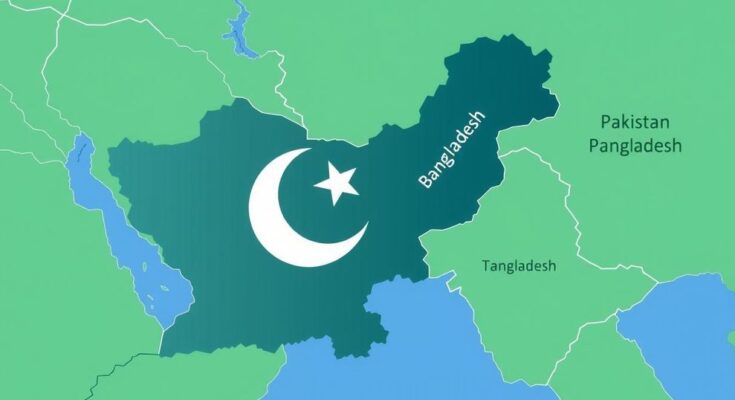Bangladesh and Pakistan are experiencing a thaw in relations, marked by direct trade and military cooperation. Historical animosities persist, particularly stemming from the 1971 independence war. Analysts suggest that the rapprochement could be a strategic counter to India’s influence. The situation is closely monitored by India, reflecting concerns over regional stability as Bangladesh approaches upcoming elections.
Recent political shifts in Bangladesh, especially following Prime Minister Sheikh Hasina’s ousting, have fostered improved relations between Bangladesh and Pakistan, both historically adversarial nations. Direct trade has begun, with Bangladesh importing 50,000 tonnes of rice from Pakistan, and there are renewed military contacts, simplified visa procedures, and considerations of security cooperation.
The animosity between Bangladesh and Pakistan dates back to 1971, when Bangladesh, then Eastern Pakistan, fought for independence. India’s support for the Bengali struggle solidified its influence in the region. From 2001 to 2006, Bangladesh maintained cordial relations with Pakistan, but Hasina’s governance from 2009, favored a pro-India stance, distancing the two nations.
As relations improved post-Hasina’s recent exit, former diplomat Humayun Kabir remarked on the potential normalization of ties, indicating a return to “two normal neighbours”. These developments have alarmed India, which is closely observing the situation due to its fraught historical relationship with Pakistan and recent tensions with Bangladesh.
Ties between Bangladesh and India have soured since Hasina’s departure, with India remaining unresponsive to Bangladesh’s extradition requests regarding Hasina. Some analysts suggest that the Bangladesh-Pakistan rapprochement represents a strategic counterweight against India’s dominance in the region. Ayesha Siddiqa, a Pakistani scholar, noted the current tactical relationship focused on collaborative pushback against India.
Military relations have also revitalized, including visits by Bangladeshi military officials to Pakistan and joint maritime exercises. Veena Sikri, former Indian high commissioner to Bangladesh, expressed concern over the military collaborations, recalling past accusations regarding training of insurgents in Bangladesh by Pakistani intelligence.
Despite increased cooperation, Indian analysts express concerns over military ties and the potential resurgence of Islamist parties in Bangladesh supporting Pakistan. The Yunus administration has denied Indian media claims of ISI officials visiting Dhaka or Pakistani operatives establishing camps for insurgents.
Although Bangladesh prioritizes its historical grievances, especially regarding the unaddressed atrocities of the 1971 war, there are calls for improvement in economic ties. Economists suggest focusing on enhancing bilateral trade, currently underperforming at less than $700 million, could yield benefits for both nations.
High tariffs and travel restrictions remain barriers but, as noted by Sabrin Beg from the University of Delaware, political efforts aimed at reinforcing relations could ameliorate these issues. Upcoming meetings, including one involving Pakistan’s foreign minister, may address these ongoing challenges, especially with impending general elections in Bangladesh, which could alter foreign policy priorities.
Ultimately, the stakes for India are high in anticipating stability and friendship from a neighboring Bangladesh, as it seeks to preserve peace in its northeastern states.
In summary, the thawing of relations between Bangladesh and Pakistan, marked by renewed trade and military contacts, poses a notable development in South Asian geopolitics. While historical grievances remain significant, the potential for improved economic collaboration may provide opportunities for both nations. Indian apprehensions regarding these developments highlight the complexities involved in regional stability and the importance of diplomatic engagements in overcoming historical animosities.
Original Source: www.bbc.com




